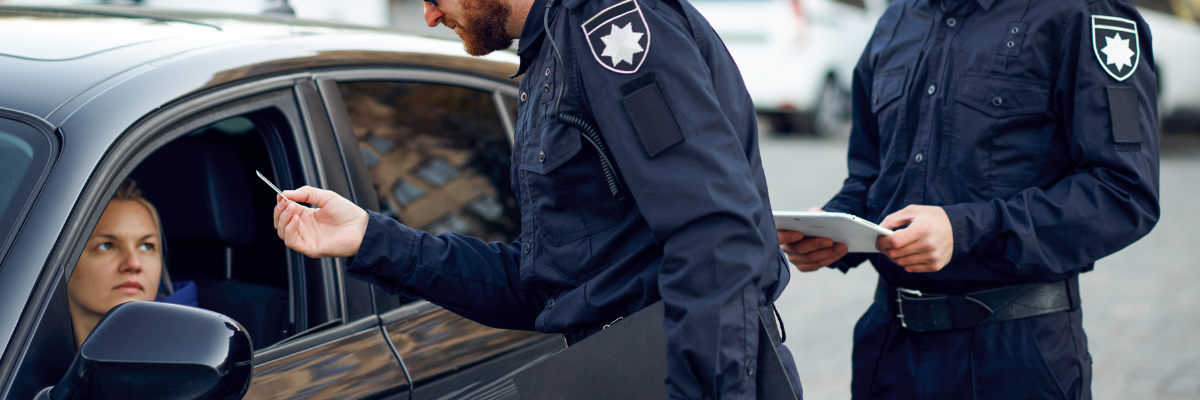Understanding Your Rights at Sobriety Checkpoints
Picture this: You’re driving home after a dinner out with friends when traffic slows to an agonizing crawl. You wonder if there’s an accident ahead. Flashes of blue and red emanate from the horizon— a clear indicator that whatever has happened, the police are involved. As you approach what you assumed to be a vehicle wreck, you notice an officer stopping a car a few paces ahead. His flashlight shines across the driver’s face, and that’s when you realize you’re not amidst a traffic jam. You’re entering a checkpoint.
Sobriety checkpoints, also known as DUI checkpoints, are police traffic stops aimed to identify intoxicated drivers and remove them from the roads. Vehicles are stopped according to a predetermined pattern, such as every 5th car, to avoid profiling, and drivers are checked for impairment. While these checkpoints aim to reduce drunk driving incidents, we at the Gross Law Group believe it’s imperative for citizens to understand and exercise their rights during these situations.
What to Do at a Sobriety Checkpoint
Stay Calm: Have your driver’s license, registration, and insurance card within reach and easily accessible. Fumbling to retrieve this information may give off the allusion you’re disoriented and possibly impaired.
Be Polite: Always address the officers calmly and respectfully. Responding with impatient or aggressive behavior can escalate the situation and lead to legal ramifications.
Contact a Lawyer if Arrested: If you’re charged with a DUI, it’s imperative to seek legal representation as soon as possible. Remember to never discuss your case with anyone except a licensed attorney.
Finally, and most crucially, when your vehicle is stopped at a checkpoint, always exercise your constitutional rights.
Your Rights at a Sobriety Checkpoint
The Right to Remain Silent: If an officer questions you on where you’ve been or whether you’ve been drinking, you have no legal obligation to answer. Responding to their inquiries can provide them with incriminating information that leads to an arrest. Instead, politely state that you choose to exercise your constitutional right to remain silent.
The Right to Refuse Consent to Search Your Vehicle: During the stop, you may be asked for permission to search your vehicle. Unless the officer has probable cause to believe a crime has been committed, you have the right to refuse this request.
The Right to Decline Field Sobriety Tests: North Carolina law allows citizens to refuse to participate in a field sobriety test without legal penalties. However, be aware that refusal leads to further investigation for other evidence of impairment and possible arrest.
The Right to Refuse a Portable Breath Test Before Arrest: You can refuse a pre-arrest portable breathalyzer test without statutory penalties; however, as with a field sobriety test, refusing can create a suspicion of impairment and lead to your arrest. Find more information on the consequences of refusing a breath test here.
The Requirement to Comply with a Chemical Analysis: Following an arrest at a DUI checkpoint, you are required by law to submit to an official chemical analysis (ie. a breathalyzer test at the station). If you refuse to comply at this stage, your driver’s license will be immediately revoked, and you’ll face strict penalties.
Sobriety Checkpoints Legality
The U.S. Supreme Court has ruled sobriety checkpoints to be constitutional, provided that law enforcement adheres to strict guidelines, such as publicizing the checkpoint in advance and following a neutral pattern for stopping vehicles. It’s important to note that while stopped, you can be cited for other traffic violations aside from a DUI. However, while the officer can ticket you with other vehicular offenses, they cannot charge you with an unrelated crime.
Understanding your options at sobriety checkpoints helps safeguard your rights and ensures law enforcement respects your constitutional protections. Still, legal complications can occur, and if they do, know the Gross Law Group is here to support you or your loved one through this difficult time. Our seasoned legal team, headed by Attorney David K. Gross, is dedicated to providing robust defense for those facing DUI charges and advocating for the rights of drivers throughout North Carolina. If you find yourself in need of legal assistance or have questions about sobriety checkpoints, don’t hesitate to reach out to us for expert assistance. Remember, the best defense against DUI charges is to avoid driving under the influence altogether. Stay stay safe, and know your rights.
HAVE QUESTIONS ABOUT YOUR RIGHTS? CALL GROSS LAW GROUP TODAY.
Sobriety checkpoints, while they serve an important purpose, can lead to serious charges that deeply affect your future. If you have questions about your rights or if you’re facing a DUI, it’s crucial to seek expert advice and representation from a seasoned legal team as soon as possible. Choose The Gross Law Group led by Attorney David K. Gross for expert criminal defense. Protect your future with personalized attention and aggressive representation. Contact us today to schedule your confidential consultation.





